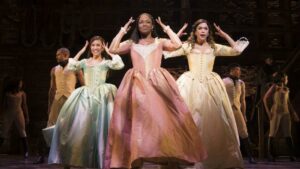Diversity in the Theatre Workforce
Earlier this year The Stage reported on an arts council report which stated “BAME and disabled staff still ‘significantly underrepresented’ in theatre.” In 2016 The Guardian reported on another arts council report with the headline ‘Number of BAME arts workers must improve.’

So why is this still a problem?
Theatre has a history of pushing boundaries and opening doors. Broadway’s hit musical Hamilton casts black, rapping performers into the role of one of America’s founding fathers, the white Alexander Hamilton. Graeae Theatre Company champion the inclusion
of D/deaf and disabled people in the arts, actively placing D/deaf and disabled actors centre stage. Productions and companies which challenge views on sexual orientation, race, disability, etc. can have an enormously positive impact on the real world attitudes of audiences. Theatre is a powerful platform with the ability to drive real change in our society.
Venues regularly use the presentation of challenging and diverse content, as a means of diversifying their audience. But what of diversity in their own workforce? There is a shared vision by many of the venue leaders we speak with, for the need to diversify their workforce, but one which clearly remains a challenge. So what can be done?
Hiring executives from different markets
Businesses are usually extremely strict about the experience and skill set required in order to qualify for an executive position. Whilst they may have intentions or obligations with regards to diversity and BAME, if there are only a finite number of skilled or experienced candidates in these categories because they simply haven’t been given the opportunities, and those are qualified aren’t interested for reason of salary, location, etc. what other choice do you have? One option is using a good headhunter who works across several different industries, to recruit candidates with very similar skill sets and values, from other markets. The candidate can learn any missing knowledge on the job, with the added benefit of bringing new, often vital knowledge from a different industry to your business.
Driving change from the bottom, up
Recruit diversely into more junior positions, support team members in their career, educate and give every possible opportunity for promotion. This will not only increase the feeling of worth amongst your team, increasing morale and retention, but will ultimately supply theatre with the diverse leaders of the future.
This is not as easy as it seems: many people never visit a theatre, or think it is “not for them.” So, theatre needs to change this, and one route is through education and apprenticeships.
Educational outreach
There are traditional ways of attracting people from different backgrounds. Theatres supply free or discounted tickets to schools to get students interested in watching theatre from an early age, building and diversifying their future audiences. But how about attracting them to careers working in the business side of theatre?
An apprenticeship programme which allows children and young adults to experience working within the various departments in a venue is an excellent way to attract a diverse future workforce. There are a number of government-funded schemes in place to support this, such as the StepForward programme run by The Challenge which targets school students from deprived areas or backgrounds. The Clore Leadership Programme is committed to diversity and equality, supporting Arts Council England’s Creative Case for Diversity and partnering with the likes of the BBC to help them deliver their Diversity and Inclusion Strategy. Clore also offers a Disabled Leaders Bursary.
We spoke with CEO of Eden Court, James Mackenzie-Blackman about the steps he took during his time at the Lyric Theatre Hammersmith. At the time, West London had some of the highest levels of young people self-electing not to attend school in England and there was huge pressure on the councils to deal with it. James took inspiration from a performing arts project in Brooklyn, to use the performing arts to improve the literacy and numeracy skills of young people not in education, employment of training. He employed drama and dance practitioners, along with numeracy and literacy practitioners to co-deliver ‘START’ – an eight week programme aimed at getting young people to pass their Level 2 Maths and English qualifications. 90% of attendees passed these by the end of the programme, and START is still running ten years on.
For these young people, from a hugely diverse background, it meant that the theatre was not a mysterious and foreboding place, but somewhere they went to in order to learn and grow. And perhaps, at a later stage, to work.
James Dodd
Martin Tripp Associates is a London-based executive search consultancy. We work across the media, information, communications and entertainment industries. This means we can bring best practice from across the sectors to your business. We have also worked with some of the world’s biggest brands on challenging senior positions. Feel free to contact us to discuss any of the issues raised in this blog.